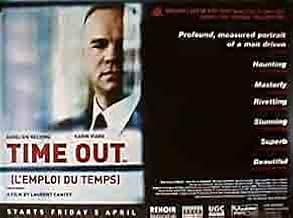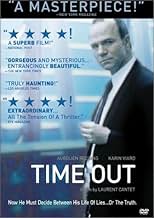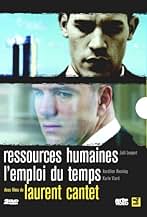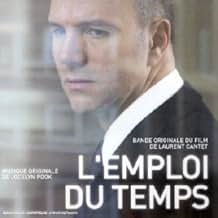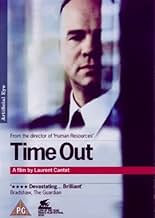IMDb-BEWERTUNG
7,3/10
5151
IHRE BEWERTUNG
Füge eine Handlung in deiner Sprache hinzuAn unemployed man finds his life sinking more and more into trouble as he hides his situation from his family and friends.An unemployed man finds his life sinking more and more into trouble as he hides his situation from his family and friends.An unemployed man finds his life sinking more and more into trouble as he hides his situation from his family and friends.
- Regie
- Drehbuch
- Hauptbesetzung
- Auszeichnungen
- 3 Gewinne & 8 Nominierungen insgesamt
Didier Reyes
- Philippe
- (as Didier Perez)
Empfohlene Bewertungen
10jotix100
"Time Out" seems to be the wrong translation for "L'emploi du temps". Laurent Cantet, the brilliant French director has given us a film that has a hypnotic quality and makes the viewer thinks. M. Cantet also wrote the material for the movie with Robin Campillo. This is, without a doubt, one of the most satisfying films coming from France in recent memory. As he proved with his "Human Resources", M. Cantet loves to present us stories in which characters are at the crossroads of their lives facing dilemmas related to things in the work environment.
If you haven't watched the film, perhaps you should like to stop reading now.
Vincent, the main character of "Time Out", is seen at the beginning of the film driving aimlessly through rural France, stopping at rest stops to sleep, buying things at roadside shops, or just idling around. When he calls his wife Muriel in his cell phone, we hear banal conversation between a married couple where the husband is calling home to check on his family. The only trouble is that Vincent is unemployed and he is reluctant to break the news to the family.
This man has a lovely wife, three normal children. His parents seem to have a good relationship with him. We see no sight of conflict. That is why so hard to understand what makes Vincent tick. Is it shame? Is it an ego thing? Is it his pride? Nothing seems to answer our questions because for all appearances, he is a normal person.
When Vincent hints about the possibility of a job in Geneva with the UN, his father, as well as the rest of the family believes him. Vincent witnesses a meeting in the UN building about the investment opportunities in Africa and how is that body going to be instrumental in helping the emerging economies. Suddenly, Vincent makes a plan to get some of his friends part with their savings by inventing a sure plan with incredible returns. In a way, it seems that people will be reluctant of schemes such as this one, but obviously, greed play a great deal in their minds and they give money to any charlatan. I know it first hand since I have a close friend that lost a lot of money this way, even though he understood about the risks involved.
Jean Michel, the mysterious man that happens to overhear Vincent pitching the idea to prospective investors, realizes the impossibility of the scheme. Vincent tells him about his plight and Jean Michel offers him a job helping him smuggle the counterfeit merchandise that makes a lot of money.
Unfortunately for liars, discovery is only a phone call away. Muriel finds out the truth and confronts Vincent about it. She tells her father in law, who has given an obscene amount of money to Vincent. When the father arrives at the house, Vincent flees into the night to the comforting highways that have become his best friends because they don't ask anything of him. Eventually, Vincent is seen calling Muriel from a roadside. She pleads with him to come home, but he refuses. The turmoil within his soul will not let him see the end of the tunnel. In his own mind, there is no solution for the problem he created.
The director hints to an easy solution for Vincent with an imminent suicide, but no. In the last sequence that ends the picture, we watch a Vincent dressed all in black being interviewed for a job that his father has been instrumental in securing for him. Are we seeing the truth, or are we seeing what the director has brilliantly done in order to get take us to a possibility that will register as the solution in our minds. The only thing is M. Cantet has left us clues about what really becomes of Vincent.
Aurelien Recoing, is a terrific actor. As times he reminds us of Kevin Spacey, and at times, he resembles a more ethereal James Gandolfini, but make no mistake, M. Recoing is an actor who captured the essence of the troubled Vincent. As Muriel, Karin Viard, is perfect. She gives a restrained performance. Also, Serge Livrozet, the kind Jean Michel, makes a wonderful appearance.
We await for the next work by the amazing Laurent Cantet.
If you haven't watched the film, perhaps you should like to stop reading now.
Vincent, the main character of "Time Out", is seen at the beginning of the film driving aimlessly through rural France, stopping at rest stops to sleep, buying things at roadside shops, or just idling around. When he calls his wife Muriel in his cell phone, we hear banal conversation between a married couple where the husband is calling home to check on his family. The only trouble is that Vincent is unemployed and he is reluctant to break the news to the family.
This man has a lovely wife, three normal children. His parents seem to have a good relationship with him. We see no sight of conflict. That is why so hard to understand what makes Vincent tick. Is it shame? Is it an ego thing? Is it his pride? Nothing seems to answer our questions because for all appearances, he is a normal person.
When Vincent hints about the possibility of a job in Geneva with the UN, his father, as well as the rest of the family believes him. Vincent witnesses a meeting in the UN building about the investment opportunities in Africa and how is that body going to be instrumental in helping the emerging economies. Suddenly, Vincent makes a plan to get some of his friends part with their savings by inventing a sure plan with incredible returns. In a way, it seems that people will be reluctant of schemes such as this one, but obviously, greed play a great deal in their minds and they give money to any charlatan. I know it first hand since I have a close friend that lost a lot of money this way, even though he understood about the risks involved.
Jean Michel, the mysterious man that happens to overhear Vincent pitching the idea to prospective investors, realizes the impossibility of the scheme. Vincent tells him about his plight and Jean Michel offers him a job helping him smuggle the counterfeit merchandise that makes a lot of money.
Unfortunately for liars, discovery is only a phone call away. Muriel finds out the truth and confronts Vincent about it. She tells her father in law, who has given an obscene amount of money to Vincent. When the father arrives at the house, Vincent flees into the night to the comforting highways that have become his best friends because they don't ask anything of him. Eventually, Vincent is seen calling Muriel from a roadside. She pleads with him to come home, but he refuses. The turmoil within his soul will not let him see the end of the tunnel. In his own mind, there is no solution for the problem he created.
The director hints to an easy solution for Vincent with an imminent suicide, but no. In the last sequence that ends the picture, we watch a Vincent dressed all in black being interviewed for a job that his father has been instrumental in securing for him. Are we seeing the truth, or are we seeing what the director has brilliantly done in order to get take us to a possibility that will register as the solution in our minds. The only thing is M. Cantet has left us clues about what really becomes of Vincent.
Aurelien Recoing, is a terrific actor. As times he reminds us of Kevin Spacey, and at times, he resembles a more ethereal James Gandolfini, but make no mistake, M. Recoing is an actor who captured the essence of the troubled Vincent. As Muriel, Karin Viard, is perfect. She gives a restrained performance. Also, Serge Livrozet, the kind Jean Michel, makes a wonderful appearance.
We await for the next work by the amazing Laurent Cantet.
People may lie for the thrill of being appreciated, or out of the fear of not being so; but while a fantasy world may initially seem liberating, it can become a prison as well. These themes are explored in 'Time Out', the story of Vincent, a man who loses his job and pretends he hasn't, rather than face up to the truth. There's a nice absence of didacticism in the way this film is assembled, a rich picture is assembled but without any attempt to ram a single interpretation down the audience's throat; it adds up to a fine portrait of depression, and a loneliness that oddly can exist only within a relationship. But there's also a creativeness in Vincent's behaviour which is necessary to generate the plot but which doesn't quite square with the rest of the movie: the film is more convincing once Vincent is deeply trapped in the web of his own lies, rather than when he is spinning it. At the heart of 'Time Out', Vincent remains an enigma unclarified: it is this that is both the film's strength and weakness. It's not a perfect film, and the start is quite dull, but the longer it lasts, the deeper it feels.
There is a telling moment toward the end of the new French film L'Emploi Du temps (Time Out) when the main protagonist confides to another character that he hated his previous job so much that many times while driving to a designated business appointment he would intentionally miss the appropriate exit and continue driving aimlessly , not wanting to leave his car. This behavior eventually results in his dismissal , a fact he hides from his family.
A white collar worker who has lost enthusiasm for his job , Vincent spends each "work day" sitting in public parks and eateries fabricating imaginary business meetings and appointments , talking to his wife on a cell phone and promising her that he will be home soon ; for supposed longer trips he sleeps in his car at night , interrupted at times by parking lot security who gruffly tell him to leave, What follows is a devastating tale of lies and more lies , of eroding relationships with wife , children , parents and friends. Vincent finds himself in a nether world and this film's director , Laurent Cantet , brings a chillingly cold but compassionate eye to the proceedings. Curtly refusing help from a former friend and business associate who is aware of his predicament , Vincent becomes enmeshed in a labyrinth of deceitful money making schemes. If all this seems like so much high melodrama , be assured that Mr. Cantet has painted as naturalistic a portrait of one man's modern day angst as has been seen on the screen in many a moon. Here is a filmmaker who possesses a keen eye for ordinary , everyday life. What distinguishes this magnificent film from most contemporary releases is its total lack of artifice. Each sequence in this riveting movie is so spontaneous that it convinces the viewer that what is happening is real. Much of the credit for this must go to Aurelien Recoing as Vincent. A handsome French actor , he portrays a likable fellow encroaching middle age who has lost his way ; as the film progresses , his sturdy frame becomes weighed down as much from literally running away from home and responsibilities as running from himself. Equally impressive is Karin Viard as Vincent's loving but exasperated wife. The movie also benefits immeasurably from the director's penchant for casting on professionals in supporting roles , no better an example than the presence of Serge Livrozet as a petty crook , a character who serves as an important catalyst for the film's gripping denouement. Mr. Livrozet , who acts with the authority of a seasoned professional and turns in a brilliant performance , is in real life an ex-convict who apparently lived the life he portrays on screen. This adds a verisimilitude that makes watching this movie such a sobering experience. As spontaneous as this picture feels , it doesn't lack for a meticulous production design. Elegant camera work , carefully appropriated sets ( the interiors of the Geneva office building Vincent wanders through look as though they were photographed and designed by Stanley Kubrick ) add to the chilly atmosphere. Jocelyn Pook's melancholy chamber music seems suffocatingly oppressive at first but achieves an overwhelming resonance at the story's climax. One man's isolation may not seem like an earth shaking subject for a movie.
Playwrights from Becket to Genet to Miller have traversed this area very eloquently in the past. But Laurent Cantet has fashioned a modern day morality tale that very quietly and methodically builds to a fever pitch of anger , loss and sorrow. The final scene of this film is devastating ; it will fill you with contradictory emotions. It is one of the great endings in movies. L'Emploi Du temps is a giant of a film , a masterpiece for our time.
A white collar worker who has lost enthusiasm for his job , Vincent spends each "work day" sitting in public parks and eateries fabricating imaginary business meetings and appointments , talking to his wife on a cell phone and promising her that he will be home soon ; for supposed longer trips he sleeps in his car at night , interrupted at times by parking lot security who gruffly tell him to leave, What follows is a devastating tale of lies and more lies , of eroding relationships with wife , children , parents and friends. Vincent finds himself in a nether world and this film's director , Laurent Cantet , brings a chillingly cold but compassionate eye to the proceedings. Curtly refusing help from a former friend and business associate who is aware of his predicament , Vincent becomes enmeshed in a labyrinth of deceitful money making schemes. If all this seems like so much high melodrama , be assured that Mr. Cantet has painted as naturalistic a portrait of one man's modern day angst as has been seen on the screen in many a moon. Here is a filmmaker who possesses a keen eye for ordinary , everyday life. What distinguishes this magnificent film from most contemporary releases is its total lack of artifice. Each sequence in this riveting movie is so spontaneous that it convinces the viewer that what is happening is real. Much of the credit for this must go to Aurelien Recoing as Vincent. A handsome French actor , he portrays a likable fellow encroaching middle age who has lost his way ; as the film progresses , his sturdy frame becomes weighed down as much from literally running away from home and responsibilities as running from himself. Equally impressive is Karin Viard as Vincent's loving but exasperated wife. The movie also benefits immeasurably from the director's penchant for casting on professionals in supporting roles , no better an example than the presence of Serge Livrozet as a petty crook , a character who serves as an important catalyst for the film's gripping denouement. Mr. Livrozet , who acts with the authority of a seasoned professional and turns in a brilliant performance , is in real life an ex-convict who apparently lived the life he portrays on screen. This adds a verisimilitude that makes watching this movie such a sobering experience. As spontaneous as this picture feels , it doesn't lack for a meticulous production design. Elegant camera work , carefully appropriated sets ( the interiors of the Geneva office building Vincent wanders through look as though they were photographed and designed by Stanley Kubrick ) add to the chilly atmosphere. Jocelyn Pook's melancholy chamber music seems suffocatingly oppressive at first but achieves an overwhelming resonance at the story's climax. One man's isolation may not seem like an earth shaking subject for a movie.
Playwrights from Becket to Genet to Miller have traversed this area very eloquently in the past. But Laurent Cantet has fashioned a modern day morality tale that very quietly and methodically builds to a fever pitch of anger , loss and sorrow. The final scene of this film is devastating ; it will fill you with contradictory emotions. It is one of the great endings in movies. L'Emploi Du temps is a giant of a film , a masterpiece for our time.
Ironically, I just saw this a day after viewing Abbas Kiarostami's brilliant "Close Up", a story of a man who could no longer accept the endless banalities of his life and decided to become someone else (a film director!). That man had no sense of identity about himself but he knew what he cared about and what he believed in (the power of art and cinema). That brings him one up on the hero of this story. Vincent is a man who also cannot accept the banalities of his life, but he hasn't the foggiest idea of who he is or what he really cares about. It's as if he was born out of a computer software program. He knows what he's supposed to care about: nice home, nice car, nice bank account... But his work as an investor is so deprived of any human value that he loses all sense of values. His environment; a sterile, generic, upper middle-class vacuum that could make one believe that all of France has turned into Silicon Valley with a touch of the Scandinavian, has none of the passion or warmth that one identifies with being human. He has a loving wife, but according to his 'program', he believes that he would lose her if she knew that he was no longer able to function as a cog in the machine, and provide her with the lifestyle that she has grown accustomed to.
That is the first tragedy of Vincent, because his wife really does love him. The second tragedy of Vincent, is that even though he recognizes his need for freedom, he doesn't know how to use it. He's like a man who has been released from a lifetime of imprisonment, but still hangs around the prison yard because he is unable to comprehend what might be available to him. He'd lost his job because his love for being free was more important to him than keeping his appointments, but most of his time spent in his new-found freedom is in doing the same job he'd done before: investments. The only difference now is that he likes to believe that the investments are helping developing Third World countries. He knows that there really are no investments (he keeps the money that people give him and spends it on a nifty Range Rover, among other things), but momentarily, he can feel as if he is 'somebody' to his family and friends when he tells them of this meaningful new job he (allegedly) has.
Vincent has been described by many as 'everyman', but I think of him more as 'everyman who has just stepped through the looking glass'. Instead of taking a good, hard look at himself, he somehow ended up taking a look beyond himself because he could not find a reflection. He can't even recognize how much he's patterned his children to follow the same program he did. We see him teaching his kindergarten-age son how to 'hard sell' his toys at a school fair. Later, in a fascinating scene, we see him and his family doing what most people of his class do in their free time. They go shopping in an upscale, overpriced store to buy clothing that they know they don't really need. Vincent has it all, but it fills nothing in him. His family has it all, yet they don't seem to question the fact that they rarely spend any time together.
Laurent Candet has created a beautifully somber and sober look at the price of 'success'. The film is practically drained of all color, save for blues and grays, to illustrate the life force that has been systematically drained from Vincent throughout his life. And the score, a somber cello piece, refreshingly accentuates Vincent's mind instead of his actions (like most scores do). It is like a slow-moving merry-go-round that brings on a sense of familiarity that is simultaneously comfortable and unnerving. Because what the gist of it all is: is that no one wants to spend their life on a merry-go-round. Even a comfortable one.
That is the first tragedy of Vincent, because his wife really does love him. The second tragedy of Vincent, is that even though he recognizes his need for freedom, he doesn't know how to use it. He's like a man who has been released from a lifetime of imprisonment, but still hangs around the prison yard because he is unable to comprehend what might be available to him. He'd lost his job because his love for being free was more important to him than keeping his appointments, but most of his time spent in his new-found freedom is in doing the same job he'd done before: investments. The only difference now is that he likes to believe that the investments are helping developing Third World countries. He knows that there really are no investments (he keeps the money that people give him and spends it on a nifty Range Rover, among other things), but momentarily, he can feel as if he is 'somebody' to his family and friends when he tells them of this meaningful new job he (allegedly) has.
Vincent has been described by many as 'everyman', but I think of him more as 'everyman who has just stepped through the looking glass'. Instead of taking a good, hard look at himself, he somehow ended up taking a look beyond himself because he could not find a reflection. He can't even recognize how much he's patterned his children to follow the same program he did. We see him teaching his kindergarten-age son how to 'hard sell' his toys at a school fair. Later, in a fascinating scene, we see him and his family doing what most people of his class do in their free time. They go shopping in an upscale, overpriced store to buy clothing that they know they don't really need. Vincent has it all, but it fills nothing in him. His family has it all, yet they don't seem to question the fact that they rarely spend any time together.
Laurent Candet has created a beautifully somber and sober look at the price of 'success'. The film is practically drained of all color, save for blues and grays, to illustrate the life force that has been systematically drained from Vincent throughout his life. And the score, a somber cello piece, refreshingly accentuates Vincent's mind instead of his actions (like most scores do). It is like a slow-moving merry-go-round that brings on a sense of familiarity that is simultaneously comfortable and unnerving. Because what the gist of it all is: is that no one wants to spend their life on a merry-go-round. Even a comfortable one.
10cestmoi
Has anybody ever set up a truck stop shot more magnificently?
This film is the full ten thing. Cast is spectacular, the photography superb, the unobtrusive music on the money, the story and its effects on the life of a family, affecting. Subtlety is a hallmark here. If you don't know the story line it must be even more powerful in a first viewing. As Fellini made at least two films that can be seen as defining the male of the Catholic/Italian species (8 1/2 & Amarcord) this magnificent film from France from a director I am not familiar with, defines "the problem of being male." I was fully involved and unable to complete a sentence for twenty minutes after the lights went up. But it is just not male identification at work here. It is the anguish and plight of the wife, magnificently played by Karen Viard, or the children who are as confused and anxious as any of us. The father, a very French man with a franc or euro, even redeems himself with love and compassion. And the "unsavory" seller of bogus goods who rescues our Vincent by offering employment, comes through swimmingly with compassion and understanding. I can not recommend this film enough. Please see it.
This film is the full ten thing. Cast is spectacular, the photography superb, the unobtrusive music on the money, the story and its effects on the life of a family, affecting. Subtlety is a hallmark here. If you don't know the story line it must be even more powerful in a first viewing. As Fellini made at least two films that can be seen as defining the male of the Catholic/Italian species (8 1/2 & Amarcord) this magnificent film from France from a director I am not familiar with, defines "the problem of being male." I was fully involved and unable to complete a sentence for twenty minutes after the lights went up. But it is just not male identification at work here. It is the anguish and plight of the wife, magnificently played by Karen Viard, or the children who are as confused and anxious as any of us. The father, a very French man with a franc or euro, even redeems himself with love and compassion. And the "unsavory" seller of bogus goods who rescues our Vincent by offering employment, comes through swimmingly with compassion and understanding. I can not recommend this film enough. Please see it.
Wusstest du schon
- WissenswertesInspired by a true story, that of Jean-Claude Romand. In reality, Romand went on to kill, on January 9, 1993, his wife, two children and both his parents. It is the first of three films in two years inspired by the case, followed by Ein perfektes Leben (2002) and Nobody's Life (2002), of which the former is the closest to the real events. Phantom (2002) was also inspired by the same incident.
- VerbindungenFeatured in The 2003 IFP Independent Spirit Awards (2003)
- SoundtracksL'Emploi Du Temps - Musique Originale
Composed by/ Arranged By Jocelyn Pook
Performed by 'Electra Strings' Ensemble
Cello Solo performed by Sophie Harris
Viola Solo performed by Clive Howard
Violin solo performed by Jacqueline Norrie
Phonographic Copyright (p) Jocelyn Pook / Haut et Court
Under Exclusive License To Virgin France
Published By Chester Music Ltd.
© 2001 Virgin France
Top-Auswahl
Melde dich zum Bewerten an und greife auf die Watchlist für personalisierte Empfehlungen zu.
- How long is Time Out?Powered by Alexa
Details
Box Office
- Bruttoertrag in den USA und Kanada
- 448.542 $
- Weltweiter Bruttoertrag
- 1.213.913 $
- Laufzeit2 Stunden 14 Minuten
- Farbe
- Sound-Mix
- Seitenverhältnis
- 1.85 : 1
Zu dieser Seite beitragen
Bearbeitung vorschlagen oder fehlenden Inhalt hinzufügen





